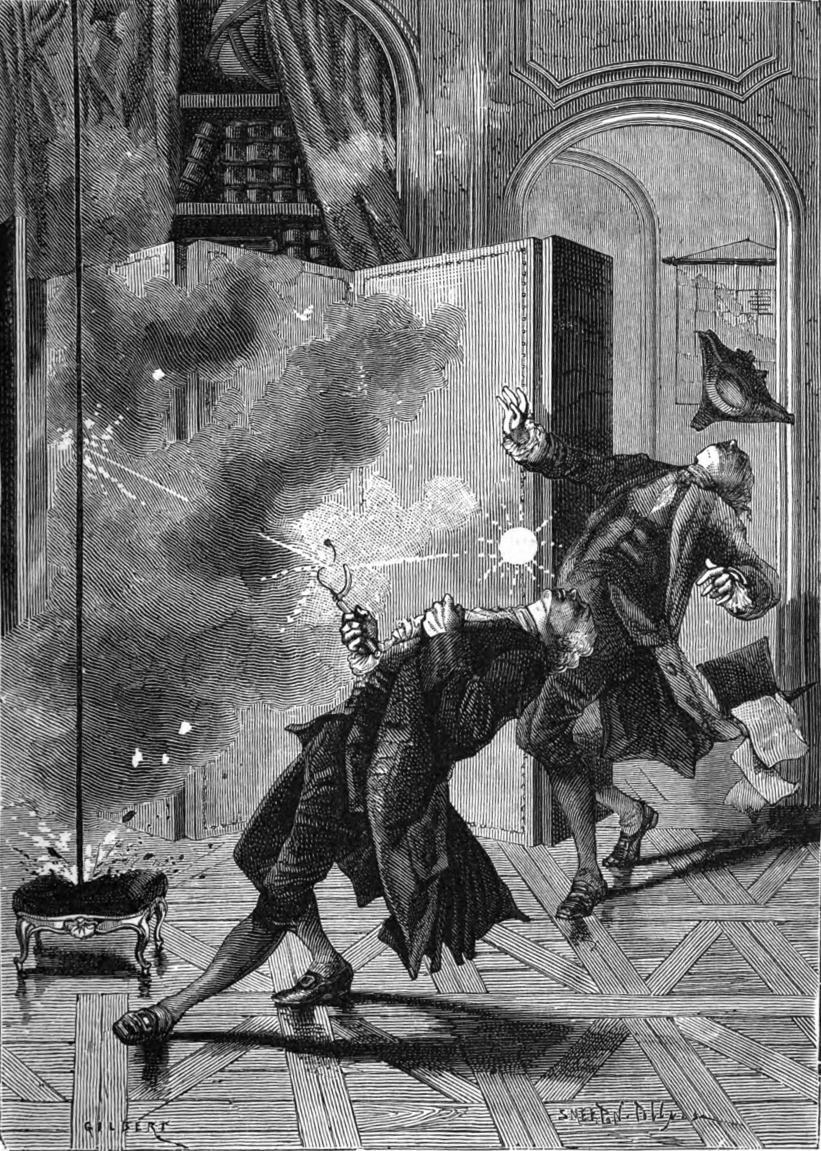Georg Wilhelm Richmann on:
[Wikipedia]
[Google]
[Amazon]
 Georg Wilhelm Richmann () (22 July 1711 – 6 August 1753), ( Old Style: 11 July 1711 – 26 July 1753) was a Russian Imperial
Georg Wilhelm Richmann () (22 July 1711 – 6 August 1753), ( Old Style: 11 July 1711 – 26 July 1753) was a Russian Imperial

 Georg Wilhelm Richmann () (22 July 1711 – 6 August 1753), ( Old Style: 11 July 1711 – 26 July 1753) was a Russian Imperial
Georg Wilhelm Richmann () (22 July 1711 – 6 August 1753), ( Old Style: 11 July 1711 – 26 July 1753) was a Russian Imperial physicist
A physicist is a scientist who specializes in the field of physics, which encompasses the interactions of matter and energy at all length and time scales in the physical universe.
Physicists generally are interested in the root or ultimate caus ...
of Baltic German descent. Richmann did pioneering work on electricity, atmospheric electricity, and calorimetry. He died by electrocution in St. Petersburg when struck by apparent ball lightning produced by an experiment attempting to ground the electrical discharge from a storm.
Early life and education
Georg Wilhelm Richmann was born on 22 July 1711 ( Old Style, 11 July 1711) in the city of Pernov (today Pärnu,Estonia
Estonia, formally the Republic of Estonia, is a country by the Baltic Sea in Northern Europe. It is bordered to the north by the Gulf of Finland across from Finland, to the west by the sea across from Sweden, to the south by Latvia, a ...
) in Swedish Livonia
Swedish Livonia ( sv, Svenska Livland) was a dominion of the Swedish Empire from 1629 until 1721. The territory, which constituted the southern part of modern Estonia (including the island of Ösel ceded by Denmark after the Treaty of Brömse ...
, which in 1721 became part of the Russian Empire as a result of the Great Northern War. Of Baltic German descent, Richmann's father died of plague
Plague or The Plague may refer to:
Agriculture, fauna, and medicine
*Plague (disease), a disease caused by ''Yersinia pestis''
* An epidemic of infectious disease (medical or agricultural)
* A pandemic caused by such a disease
* A swarm of pes ...
before he was born, and his mother remarried. In his early years he studied in Reval (today's Tallinn, Estonia
Estonia, formally the Republic of Estonia, is a country by the Baltic Sea in Northern Europe. It is bordered to the north by the Gulf of Finland across from Finland, to the west by the sea across from Sweden, to the south by Latvia, a ...
); later he studied in Germany at the universities of Halle Halle may refer to:
Places Germany
* Halle (Saale), also called Halle an der Saale, a city in Saxony-Anhalt
** Halle (region), a former administrative region in Saxony-Anhalt
** Bezirk Halle, a former administrative division of East Germany
** Hall ...
and Jena.
Career
Richmann was a Russian Imperialphysicist
A physicist is a scientist who specializes in the field of physics, which encompasses the interactions of matter and energy at all length and time scales in the physical universe.
Physicists generally are interested in the root or ultimate caus ...
. He did pioneering work on electricity and atmospheric electricity, and also worked on calorimetry, in doing so collaborating with Mikhail Lomonosov
Mikhail Vasilyevich Lomonosov (; russian: Михаил (Михайло) Васильевич Ломоносов, p=mʲɪxɐˈil vɐˈsʲilʲjɪvʲɪtɕ , a=Ru-Mikhail Vasilyevich Lomonosov.ogg; – ) was a Russian Empire, Russian polymath, s ...
. Richmann also worked as a tutor to the children of Count Andrei Osterman. Richmann translated Alexander Pope's ''Essay on Man'' into German
German(s) may refer to:
* Germany (of or related to)
**Germania (historical use)
* Germans, citizens of Germany, people of German ancestry, or native speakers of the German language
** For citizens of Germany, see also German nationality law
**Ger ...
from French
French (french: français(e), link=no) may refer to:
* Something of, from, or related to France
** French language, which originated in France, and its various dialects and accents
** French people, a nation and ethnic group identified with Franc ...
, which appeared in 1741. In that year, he was also elected a member of the St. Petersburg Academy of Sciences
The Russian Academy of Sciences (RAS; russian: Росси́йская акаде́мия нау́к (РАН) ''Rossíyskaya akadémiya naúk'') consists of the national academy of Russia; a network of scientific research institutes from across t ...
.
Accidental death
Richmann was electrocuted in St. Petersburg on 6 August 1753 ( Old Style, 26 July 1753) while "trying to quantify the response of an insulated rod to a nearby storm." He is said to have been attending a meeting of the Academy of Sciences when he heard thunder, whereupon he ran home with his engraver to capture the event for posterity. While the experiment was underway, a discharge reported to have been ball lightning appeared and collided with Richmann's head leaving him with a red spot on his forehead, his shoes blown open, and parts of his clothes singed. The ball lightning arising from the apparatus was the cause of his death. An explosion followed "like that of a small Cannon" that knocked the engraver out, split the room's door frame, and tore the door off its hinges.Some but not all of the preceding details appear in Ronald W. Clarke's presentation of a description by Benjamin Franklin of the accident. See Richmann was apparently the first person in history to die while conducting electrical experiments.
References
{{DEFAULTSORT:Richmann, Georg Wilhelm 1711 births 1753 deaths People from Pärnu People from Swedish Livonia Baltic-German people 18th-century German physicists 18th-century German inventors Physicists from the Russian Empire Inventors from the Russian Empire Full members of the Saint Petersburg Academy of Sciences Deaths from lightning strikes University of Halle alumni University of Jena alumni Accidental deaths in Russia